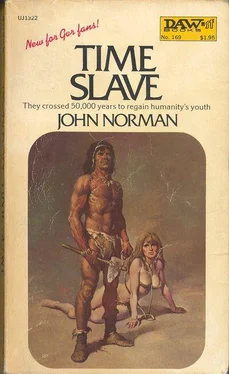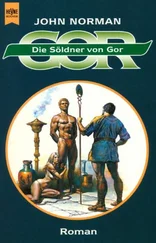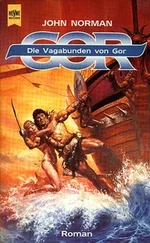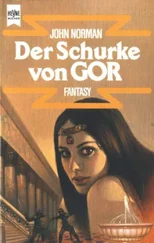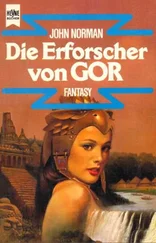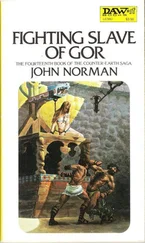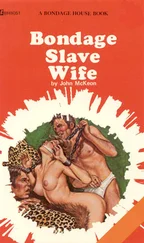Time Slave
by John Norman
Herjellsen’s device was deceptively simple.
Had he not been insane, had he not been an isolate, lonely, scorned, maddened, dissociated and crazed, the uniqueness, the simplicity of it, would doubtless not have occurred to him.
It was irrational.
It was as irrational as existence, that there should be such. The void was rational, space, emptiness. That there should be anything, gods or particles, that was the madness.
That there should be anything, that was the madness.
Dr. B. Hamilton, mathematician, Ph.D. California Institute of Technology, looked up, fingering the pencil.
It seemed startling, wondrous, that it should be.
As wondrous as suns and stars, the passage of light, and the slow turnings in the night of luminous galaxies.
Who could have predicted that there should be being? From what discursive statements of initial conditions and laws should such a prediction follow? And in the nothingness what entities might serve as values for those individual constants, and as values for those variables, for in the void there was nothing.
From nothing can come nothing.
Dr. Hamilton lit a cigarette, and drew on it, angrily, defensively.
But smoke cannot screen thoughts from themselves.
It did not appear to be a truth of logic, a matter of the meanings of words, or even of the possibilities of thought, that nothing could come from nothing.
Surely one could imagine nothing, and then something. It was imaginable, and whatever is imaginable is logically possible, conceptually possible.
Yet in some sense it did seem true, so true, that from nothing could come nothing.
It made no sense to call it a necessary truth, for its negation was semantically consistent, conceptually possible, and yet it seemed, somehow a strong truth, a likely truth.
Astronomers had speculated that, even now, matter grew, forming in the blackness.
Dr. Hamilton studied the smoke. It drifted upward toward the fluorescent tubes, lit from the compound’s generator.
If it could come into being, there seemed little reason to suppose it might not be doing so still.
But it did not seem likely.
The quantity of matter-energy in the universe remains constant.
This was an article of faith, of a transient science in a provisional epoch.
But it might be true.
But if it were true then matter, or its forms, or energy, or its forms, of which particles and smoke might be illustrations, and music and worlds, then the substance-whatever it might be-was eternal, coeval with space. There was nowhere for it to come from, nowhere for it to go.
Dr. Hamilton crushed the cigarette out.
Who was to say what was, ultimately, rational or irrational, for these are anthropomorphic predicates, indexed to the brain of an evolving primate, only within the last few thousand years discovering itself in the midst of mysteries.
The lights in the bleak room dimmed and then again waxed bright and soft.
Gunther, with William, Herjellsen supervising, was busy in the hut.
There was not a great deal of power needed for the apparatus. The compound generator produced ample power.
Hamilton speculated, smiling. Electric power, from a gasoline-driven engine, no more than five hundred volts, was ample to the needs of the crazed Herjellsen.
Hamilton did not care for Hegel. Yet the thought, that of Hegel, was difficult to dismiss. We are where the world has opened its eyes.
We were the first animal, to our knowledge, to wonder, to seek to learn, the first to seek not only love and food, but truth.
Men had found truths, in their millions, in its pebbles and grains, but he had not yet found its mountains.
Herjellsen had looked in a different direction. If he had not, he would not have seen what he had.
Herjellsen was mad, but he had seen it, where others had not.
It had come to him in the night, in his cell in Borga. He had screamed and laughed, demented in the cell, tearing the blankets, biting at his own flesh, shrieking with joy.
Hamilton recalled that Kekule’s hypothesis, of the ring theory of the benzene molecule, had come to him in sleep, in a dream, fraught with twisting snakes, before his own hearth. Three-quarters of organic chemistry, some thought, derived, directly or indirectly, from Kekule’s hypothesis. Herjellsen’s had come to him in a madman’s cell. There is no rational procedure for the discovery of hypotheses. There are no machines to produce them. They come as gifts, and sometimes to the mad, to the diseased and crazed, as to Herjellsen. But the procedures for testing hypotheses, be they real hypotheses, if they are genuine hypotheses of science, are public, accessible. The objectivity of science lies not in its genesis, but in its warrants for validity, its procedures for examination and testing, for experiment and confirmation, for, to the extent possible, proof and demonstration. Hamilton was terrified, yet exalted.
It was possible that the Herjellsen conjecture was true.
The preliminary tests had been affirmative.
Again the fluorescent tubing dimmed and then again resumed its normal degree of illumination.
The artifact lay not more than a yard from Hamilton’s hand.
It was rounded, chipped, roughly polished; it weighed 2.1 kilograms. Anthropologists would have referred to it as a tool. It was a weapon.
That there was something, that was the madness.
Who was to say what was natural and what was not? That there was something was undeniable.
Its nature had not yet been ascertained.
Hamilton arose, pushing back the chair.
A remark of Julian Huxley was difficult to dismiss from the mind.
The universe may not only be queerer than we suppose, but it may be queerer than we can suppose.
Hamilton smiled.
Laughter is the shield. Humor is the buckler against madness, against the mystery, against the immensity. Humanity had little else with which it might protect itself in the forest. It had its brains, its hands, a bit of fury, a loneliness for love, and its laughter. And that laughter, like the gravitational field of a pencil on a desk, miniscule and yet profound, might be heard to the ends of space.
We are smaller than stars but the magnitude of our laughter has not yet been measured.
All that we know rests upon a slender data base, our first-person experiences, and nothing else. Each of us in this sense is alone, in his cage of sensation, limited to his own perceptions. And each of us, a perception to the other, builds his view of the world.
Hamilton was lonely.
How do we explain the succession, the continuity of our experiences. We postulate an external world of such-and-such a type. In various times and places we would have entertained postulations quite different from those which are now taken to define the truth, and beyond their perimeters we define madness:
Herjellsen had ventured beyond the perimeters of the given speculations, the customary postulations, those postulations that define not only what answers may be given but what questions may be asked.
Particles and forces, gods and demons, fields, purposes, collisions, all had served, and some still served, to make sense out of the chaos of sensation, that which must be reconciled and accounted for, our experiences.
Science is not a set of answers, Herjellsen had once told Hamilton; it is a methodology.
We learn from Egyptian star charts that the positions of the fixed stars have changed in the past five thousand years.
They change position slowly.
So, too, with the dogmatisms of science; what seemed eternal truth when the Parthenon was fresh seems now but a mood of cognition, a moment of advance, a footstep on a path whose destination is not yet understood.
Читать дальше
